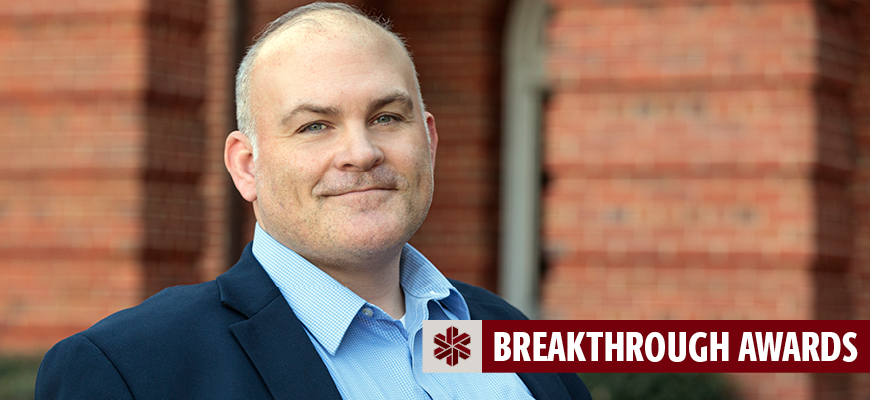
Breakthrough Star: Jason Kubinak
School of Medicine scientist studies germs, good and bad, that shape mucosal immune system
Posted on: August 10, 2022; Updated on: August 10, 2022
By Chris Horn, chorn@mailbox.sc.edu, 803-777-3085
Jason Kubinak plowed his way through plenty of books in graduate school, but one in particular — Good Germs, Bad Germs: Health and Survival in a Bacterial World — changed the course of his career.
“That book completely flipped on end the way I thought about human interaction with microbes because it led me to believe that the overwhelming majority of microbes we will ever encounter in our lives actually promote health,” says Kubinak, whose research at the University of South Carolina School of Medicine Columbia focuses on the human immune system in the gut.
“Mucosal immunology is all about maintaining a beneficial interaction between us and environmental microbes. In contrast to the highly inflammatory systemic immune response that seeks to eliminate microbes, the mucosal immune system does this largely by being tolerant of the microbes found at mucosal surfaces. I found that to be fascinating, and it just snowballed into my career.”
In their research, Kubinak and his team are exploring fundamental questions about the nature of harmful viruses and bacteria and how evolution has favored mechanisms that diversify the immune response to control them.
“B lymphocytes secrete molecules called antibodies that are specific for certain antigens, but how do we generate specific antibodies against something that we can’t plan for? The best way to do that is to produce as many different flavors of antibodies as we can,” Kubinak says. “It’s fundamental research that absolutely has direct relevance to vaccine design, the predictability of pathogen evolution and gut health.”
Kubinak’s lab is also working to better understand how antibody deficiencies — the most common form of immunodeficiency in humans — influence gastrointestinal health, which has ramifications for better understanding conditions such as ulcerative colitis, Crohn’s disease and other inflammatory and autoimmune disorders.
From the moment you're born and for every minute of your life, your body is dealing with microbes living on your skin or in your nose or in your gut, and it has direct and very immediate influences on health.
Jason Kubinak
Kubinak joined the School of Medicine four years ago and has already graduated two Ph.D. students with several more in the pipeline. He has also been instrumental in the development of research technology at the university. He helped develop the new Germfee Mouse Core, which he serves as co-director. He was also recently named director of the Flow Cytometry Core in the school’s Instrumentation Resource Facility. Germfree mice allow investigators to ask how microbes influence animal physiology. Flow cytometry allows scientists to identify individual cells such as B cells, T cells and red blood cells based on their phenotypes.
In addition to mentoring several students in laboratory research, Kubinak also teaches immunology to medical and graduate students. As director of the Flow Cytometry Core, Kubinak will also teach flow cytometry techniques to students in the master’s of biotechnology program. In teaching that topic and his other immunology courses, Kubinak leans into giving students practical experience as much as possible. “The best way to learn is to make mistakes and learn from those mistakes,” he says, but acknowledges that hands-on learning is difficult to impart with lecture-based material.
“But I try to give them real-world examples as to what a B cell and T cell is and what they do is relevant for their day-to-day health,” he says. “I try to drive home just how important and pervasive interactions with environmental microbes are.
“From the moment you're born and for every minute of your life, your body is dealing with microbes living on your skin or in your nose or in your gut, and it has direct and very immediate influences on health. When you feel healthy and good and not out of sorts, it’s because your immune system is working, making sure those bugs stay where they need to stay.”